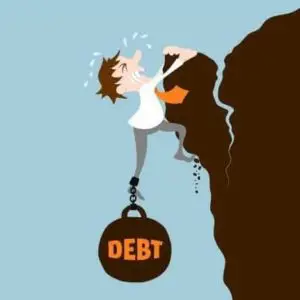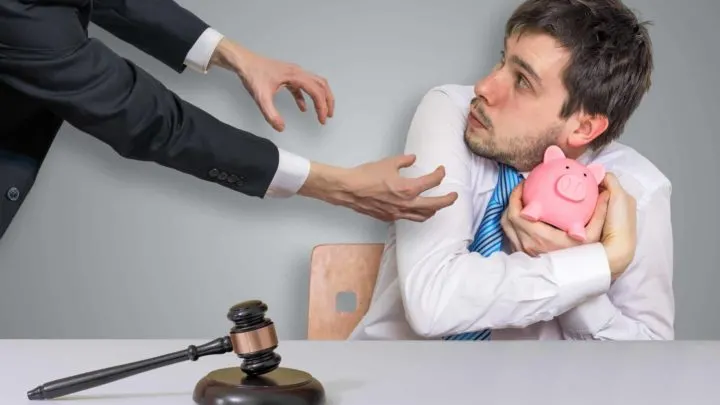If you’ve got debt, you need to be aware of the things debt collectors CANNOT do to collect that debt. Too often, debt collectors do not follow the law* and do things that are blatantly illegal in order to collect their cash.
You could save yourself thousands of dollars by understanding your rights under the Fair Debt Collection Practices Act (FDCPA). This law clearly outlines what debt collectors can and cannot do when they are trying to get you to pay on an outstanding debt.
Debt collection is a nasty business. In America, there is an entire industry built around buying and selling debt. Debt collectors buy your debt from the original creditor (the person you signed a contract with). They buy the debt for pennies on the dollar… and then they come after you for the entire amount you originally owed. Meanwhile, the company you originally owed has charged off the debt and has nothing to do with the transaction. It’s these debt buying companies that often engage in the most awful debt collection practices.

What is the FDCPA?
The Fair Debt Collection Practices Act (FDCPA) provides strict guidelines about what debt collectors can and cannot do. Unfortunately, most consumers aren’t familiar with the FDCPA so many debt collectors violate it regularly without any penalty. Even worse, these tactics work and help debt collectors recover millions – even billions – of dollars so they persist in using these tactics even when they know they’re illegal.
As a debt collector confessed in this Dateline episode, “The thing is, though… we bring in a lot of money so it’s like it’s worth it for people to still be illegal and collect money.”
The good news? If you know your rights, you can protect yourself.
What are the things debt collectors cannot do?
There are several things that collection agencies are specifically prohibited from doing by the FDCPA. These include the following.
Debt collectors cannot harass you.
Many debt collectors engage in harassment to convince people to pay their debts. Sometimes, they call at odd hours or harass employers intentionally to persuade people to pay.
Debt collectors cannot call you at certain hours. Per the FDCPA, debt collectors can only make calls after 8am and before 9pm. If they call before 8am or after 9pm, it is a violation of the debt collection law. Debt collectors are also forbidden from calling at times they know or should know are inconvenient.
If the debt collector calls and you do not answer, they must state their name, company name and declare that they are attempting to collect a debt in any voicemail they leave.
Debt collectors cannot call you over and over again. If they call right after you hang up, that’s a violation. Typically, if they debt collector calls more than once a week, they are in violation of the FDCPA.
Debt collectors cannot use profanity, embarrass you, shame you or shout at you. The FDCPA specifically forbids them from using language designed to embarrass or shame you, such as calling you a deadbeat. They cannot use profane or other abusive language. They cannot scream, shout or get angry at you. All of these are violations of the FDCPA and are punishable by law.
Debt collectors cannot keep bothering you if you tell them to stop. If you send a written request that they stop contacting you, the FDCPA says they have to stop.
Debt collectors cannot harass other people to get to you.
Under the FDCPA, debt collectors cannot call anyone (other than your spouse) more than once to try to locate you. Even if you gave them written references to call, they can only call those numbers one time. They also cannot tell anyone other than you or your spouse that they are trying to collect a debt from you.
In fact, they are forbidden from telling anyone else about the debt except you, your spouse, your attorney, the credit reporting bureaus and the debt collector’s attorney. If you are a minor, they can also tell your parents. They need specific permission from you to discuss the debt with anyone else.
Debt collectors cannot legally endanger your employment.
The FDCPA specifically forbids debt collectors from calling you at work more than one time. If they know your employer does not approve of collection calls at work, they are not allowed to call you at work at all. They cannot legally call your boss about the debt. They also cannot legally threaten you with job loss if you fail to pay.
Debt collectors cannot lie or deceive you in order to collect the debt.
Debt collectors lie constantly. Since relatively few consumers understand their rights under the FDCPA, some debt collectors are ruthless and manipulative in their lies and deceit. This is a huge issue that I’ve addressed more thoroughly in this article about debt collector scams.
Debt collectors cannot threaten to sue you when they have no intention of actually doing so. If they threaten to sue you if you do not meet a deadline and then do not actually sue you, that is a violation of the FDCPA.
One of the most frequent deceptive debt collector practices I’ve personally experienced recently goes something like this:
Someone calls you from a blocked number and claims to be a process server from a local company. They say they have legal paperwork that needs to be served on you because you are being sued in a nearby court. They give you a number for the company that is allegedly suing you.
You call the number that the so-called “process server” gave you. The company tells you that they are from the prelitigation or prelegal department and that they can only help you until you’ve been served. They repeatedly tell you that you are going to be served today and that you need to make a payment before you’re served or you won’t be able to negotiate the debt out of court.
I have refused to comply with this particular tactic twice from two different debt collectors. On both occasions, I was not served or sued… so both of these debt collection attempts were violations of the FDCPA.
Debt collectors cannot threaten you with violence, arrests, jail time or anything like that. These are things that the debt collector cannot enforce. As described above, debt collectors are not legally allowed to lie to you or use deceptive methods to try to get you to pay. Sometimes debt collectors will pretend to be affiliated with the courts, police, or government but this is also deceptive.
Debt collectors cannot threaten to garnish your wages or put a lien on your property. If they mention garnishment at all, they must clearly state that they have to successfully sue you and obtain a judgment before they can garnish your wages. They cannot say or imply anything about taking away your belongings or putting a lien on your property until after a judgment has been rendered by the courts.
Debt collectors cannot change the amount you owe or fail to verify the debt.
One of the biggest problems I personally encounter with debt collectors is that they refuse to verify the debt. I never, ever pay anything without something in writing. When I’m offered a settlement agreement on a debt, I demand to see a letter in the mail (or at least in my email) before I agree to pay. Often, the debt collector will claim that they are not allowed to send notices or letters. You have the right to make a written request for debt validation… and often, I’ve found that the reason they won’t validate is because the debt itself is invalid.
Debt collectors cannot try to collect the wrong amount. The debt collector cannot legally misrepresent the amount you owe. They cannot add small fees or make other adjustments to the amount. They cannot ask you to pay more than you owe. They are bound by the limits of the original credit or loan agreement that you signed.
Debt collectors cannot refuse to provide a written debt validation notice. Within five days of their initial communication, the debt collector must send you a written notice with the amount of the debt, name of the creditor and notice of your right to dispute the debt within 30 days. If you submit a written request to verify the debt within those 30 days, they cannot continue to collect on the debt until the debt has been verified.
Debt collectors cannot try to collect on a debt that is not valid. This happens more often than you might think! Debt collectors sometimes try to collect on debts that are too old, that were previously settled or that are straight-up fraudulent.
What happens if a debt collector violates the FDCPA?
Companies who violate the FDCPA can be held liable for damages and penalties. Per the law, the company could be ordered to pay a sum equal to the actual damages sustained because of the violation, an additional damage of up to $1,000 per violation (unless it’s a class action) and court costs for the person who is suing the debt collector.
How does the FDCPA help me?
I have saved thousands by knowing my rights under the FDCPA. I have stopped several debt collection processes just by stating that I have evidence of multiple FDCPA violations and that I will counter-sue if they don’t drop the debt.* It’s a gutsy and sometimes difficult play but it has been effective in many cases.
To do this convincingly, you’ll need to document the name and company of the person who is calling you every time you receive a debt collection call. Take notes on everything they say. Be sure to notate the name of the caller, the company they work for and the amount they say you owe. Document the time and date of the call. Document everything that could be a violation of the FDCPA. Record the conversation if you can, as long as you live in a one-party state or have the other person’s consent.
The next time the company calls, simply state that you have documentation proving that they are in violation of the FDCPA. You can state the violator’s name and date of the call. State how many violations you documented. When I have done this, usually the company drops the debt or at least stops contacting me.
If you need legal assistance, some consumer protection law firms will assist you with no up-front or out-of-pocket expenses unless the case is won. The cases are argued on a contingency basis, meaning that the law office will receive a percentage of whatever money you win in court. One of these law firms is Kazerouni Law Group in California.
Of course, you can also file a complaint on the Consumer Financial Protection Bureau website.
Got a Debt Question?
If you’ve got questions about your specific legal situation, you can click here to chat with a lawyer now. Our friends at JustAnswer have a 24/7 service that can help you with credit card debt, collections, defective products, bankruptcy, extended warranties and more! Get all of your questions answered today.

